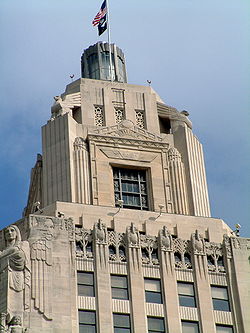- Louisiana law
-
Law in the State of Louisiana is based in part on civil law. Louisiana is unique among the 50 U.S. states in having a legal system partially based on French and Spanish codes and ultimately Roman law, as opposed to English common law.[1] Louisiana thus follows the system of most non-Anglophone countries in the world.
Contents
History
The first Louisiana Civil Code Digest of 1808 was written in French and translated into English by Martin O'Callaghan. For many years legal practitioners in the state made great effort to ensure that both versions agreed. Despite those efforts some clauses were found only in one version or the other. Due to modern legislative enactments which repeal and reenact Louisiana's civil code articles as any other collection of statutes, the differences between the original French and the English translation are now primarily of historical interest.
Despite popular belief (and Stanley Kowalski's brief explanation in the Tennessee Williams play A Streetcar Named Desire) it's incorrect to say that the Louisiana Civil Code is, or stems from, the Napoleonic Code; rather, the two law codes stem from common sources. Although the developing Napoleonic Code strongly influenced Louisiana law, it was not enacted until 1804, one year after the Louisiana Purchase. The main source of Louisiana jurisprudence may in fact be Spanish.[2] Currently, the Louisiana Civil Code consists of 3,556 individual code articles.[3]
Effective differences
Great differences exist between Louisianan civil law and common law found in all other American states. While many differences have been bridged due to the strong influence of common law, the "civilian" tradition is still deeply rooted in Louisiana private law and in some parts of criminal law.
One often-cited distinction is that while common law courts are bound by stare decisis and tend to rule based on precedents, judges in Louisiana rule based on their own interpretation of the law.[4] This distinction is not terribly crisp, though. Civil law has its own parallel respect for established precedent, the doctrine of jurisprudence constante.
Property, contractual, business entities structure, much of civil procedure, and family law are still strongly influenced by traditional Roman legal thinking. Louisiana law retains terms and concepts unique in American law: usufruct, forced heirship, redhibition, and lesion beyond moiety are a few examples.
Due to the civil law tradition, Louisiana's constitution does not contain a right to a trial by jury in civil cases, although this right is contained in the Louisiana Revised Statutes. Additionally, appellate courts have a much broader discretion to review findings of fact by juries in civil cases. [5] Also, damages are apportioned differently than in common law jurisdictions; specific performance is almost always available, and juries may hear cases that would be considered equitable in other jurisdictions.
In commercial law, the 49 other states have completely adopted the Uniform Commercial Code standardizing the rules of commercial transactions. Louisiana enacted most provisions of the UCC, except for Article 2, which is inconsistent with civil law traditions governing the sale of goods. Louisiana also refers to the major subdivisions of the UCC as “chapters” instead of articles, since the term “articles” is used in that state to refer to provisions of the Louisiana Civil Code.
Legal careers are also molded by the differences. Legal education, the bar exam, and standards of legal practice in Louisiana are significantly different from other states. For example, the Louisiana Bar Exam is the longest of any state, at 21.5 hours. The Multistate Bar Examination is not administered in Louisiana.
See also
- Quebec law
- Civil Law Commentaries
- Extra-dotal property
References
- ^ "How the Code Napoleon makes Louisiana law different". LA-Legal. http://www.la-legal.com/index.php?code_napoleon. Retrieved 2006-10-26.
- ^ George Dargo. Mainstreaming Louisiana Legal History Review of Fernandez, Mark F., From Chaos to Continuity: The Evolution of Louisiana’s Judicial System, 1712-1862. H-Law, H-Net Reviews. August, 2002
- ^ Louisiana Civil Code Reference
- ^ Engber, Daniel (September 12 2005). "Louisiana's Napoleon Complex: The French influence on Pelican state jurisprudence". Slate. http://www.slate.com/id/2126126/. Retrieved 2006-10-26.
- ^ Hargrave, W. Lee (1990). The Louisiana state constitution: a reference guide, Volume 37. Greenwood Pub Group. pp. 39. ISBN 0313266549. http://books.google.com/books?id=mvCjlG1RGs0C&pg=PA39&lpg=PA39&dq=louisiana+constitution+civilian+tradition+trial+by+jury&source=bl&ots=PC8jVZC1o4&sig=hzt6a03F-ZYAOf4Xq6z3GNsfxKc&hl=en&ei=2tW1TfWqGufr0gHe47HKAw&sa=X&oi=book_result&ct=result&resnum=4&ved=0CDMQ6AEwAw#v=onepage&q&f=false.
External links
Categories:
Wikimedia Foundation. 2010.

